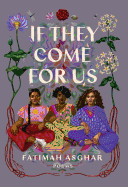
The word "partition" occurs over and over in Fatimah Asghar's book of poetry, If They Come for Us. The idea of being riven, of families, identities and even bodies broken into parts, populates the world of her poems. But these smaller, sometimes quieter partitions are ripples from a larger, cataclysmic one: the partition of India and the creation of Pakistan in 1947. Asghar's poems probe her own identity, tracing its history while at the same time creating a ground for her present and future.
The poems in If They Come for Us are jarring and passionate. But, intriguingly, Asghar matches her forceful portrayals of violence, Islamophobia, misogyny and more with a sense of playfulness. One of the first poems, "How We Left: Film Treatment," may be the best example of this interplay. In it, Asghar uses the structure of a film treatment to depict her family's escape from political genocide. Literally beginning with "[Establishing Shot]," she drives a conceptual wedge between the horror and the telling of it.
Later pieces structure themselves after a floor plan, a bingo game and a crossword puzzle to achieve similar results. Not every experiment works as well as "How We Left: Film Treatment," but each shows a talented voice using almost absurdist constraints to highlight injustice and terror. Responding to the past and present, Asghar is happy to wield structures however she sees fit, perhaps as a tool against the many partitions her work portrays. --Noah Cruickshank, adult engagement manager, the Field Museum, Chicago, Ill.

